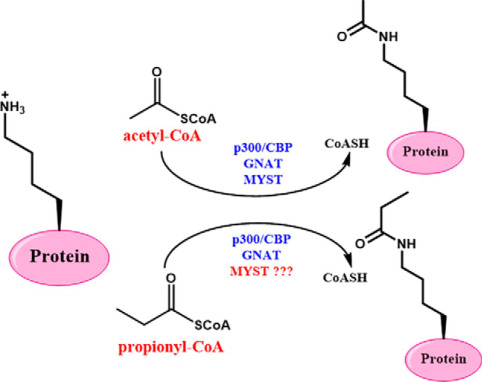Propionylation Analysis Service
A prevalent reversible post-translational modification (PTM), protein propionylation is widely distributed and extensively found in numerous enzymes participating in metabolic pathways. Its significant regulatory role extends to vital biological processes, including metabolism and photosynthesis. Creative Proteomics stands as a premier provider, offering high-quality propionylation analysis services, which cover the identification, quantification, and characterization, offering valuable insights that contribute to the advancement of your protein research.
What is Propionylation
Protein propionylation modification is a reversible and widely distributed type of post-translational modification that plays an important regulatory role in both eukaryotes and prokaryotes. It is the process of transferring the propionyl group provided by propionyl-CoA to protein lysine residues. Since the structure of propionyl-CoA is similar to that of acetyl-CoA, it can be produced by the catabolism of specific amino acids or by the oxidation of odd-chain fatty acids. It can be broken down by propionyl-CoA carboxylase or through the methyl citrate cycle. Genetic defects in the production and catabolism of propionyl-CoA can cause some toxicity, and therefore the study of propionylation is also of great clinical and human interest.

Fig.1 Schematic of propionylation (Han, Z. et al., 2018)
Lysine propionylation was first identified on histones, but has since been found on non-histone proteins as well. Although the role of protein propionylation has not been fully elucidated, histone propionylation has been observed as a marker of active chromatin. Lysine propionylation has been reported to play an important role in the overall metabolic regulatory network and metabolic enzyme activities in bacteria, and may be closely related to spermatogenesis and sperm function. Moreover, traces of propionylation modifications have been found in many enzymes involved in metabolic pathways, such as those in carbon fixation and glycolytic pathways.
Applications of Propionylation Analysis
Disease Associations
Examine known or potential associations between aberrant propionylation and diseases, offering insights into diagnostic and therapeutic opportunities.
Gene Expression Regulation
Investigate propionylation's influence on gene expression and its interaction with other epigenetic modifications, especially in the context of chromatin remodeling.
Metabolic Pathways
Explore the impact of propionylation on metabolic enzymes and pathways, shedding light on its potential roles in energy metabolism.
In addition, protein propionylation analysis has been applied to the research of photosynthesis, metabolism, cell signaling transduction, drug discovery and other fields. Protein propionylation is an important aspect of biological and pharmaceutical research that should not be neglected and has a wide range of applications.
Our Service
Creative Proteomics has advanced protein detection technologies and can provide customized services to researchers and scientists to help them reveal the complexity of PTM using powerful mass spectrometry technologies. Our services are thoughtful and detailed and the process of propionylation analysis service is as follows:

Fig.2 Propionylation analysis workflow
- Sample Preparation
Proper extraction and preparation of proteins from biological samples to ensure preservation of propionylated proteins. - Propionylation Enrichment
Enrichment techniques are employed to isolate propionylated proteins or peptides. This step is crucial as propionylation modifications are often present in low abundance compared to unmodified proteins. - Detection
WB, protein microarrays and LC-MS/MS are powerful tools for the identification and quantification of propionylated peptides, and they provide detection information that facilitates a comprehensive analysis of propionylation. - Bioinformatics Analysis
Advanced bioinformatics tools are used to analyze data, identify propionylated peptides, and map these modifications to protein sequences. - Result Delivery
After professional data analysis, we deliver results quickly and consistently.
Creative Proteomics brings a wealth of experience to the field of protein research. Our comprehensive services and products cover the entire spectrum of utilizing suitable and efficient gateways. Utilizing our proprietary platform, we have successfully implemented many proteomics research projects. If you are interested, please contact us for more information and a quote.
Reference
- Han, Z.; et al. Revealing the protein propionylation activity of the histone acetyltransferase MOF (males absent on the first). Journal of Biological Chemistry. 2018, 293(9): 3410-3420

